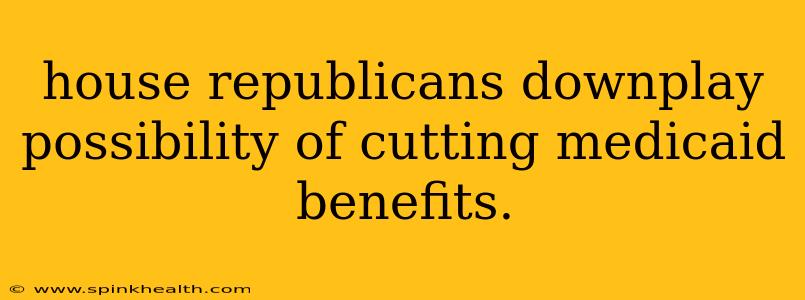House Republicans Downplay Talk of Medicaid Cuts, But Concerns Linger
The air crackled with tension. Whispers of impending cuts to Medicaid, a lifeline for millions of Americans, had rippled through the halls of Congress. But when questioned, House Republicans offered reassurances, painting a picture of fiscal responsibility that carefully sidestepped the details of potential benefit reductions. Their statements, however, haven't fully quelled the anxieties of those who rely on the program. This carefully crafted narrative raises several crucial questions.
What are House Republicans actually saying about Medicaid cuts?
The official line from House Republicans has been a carefully worded dance around the issue. They've emphasized the need for fiscal responsibility and streamlining the Medicaid system to eliminate waste and fraud. Statements often highlight the desire to protect vulnerable populations while simultaneously suggesting efficiencies and reforms can be achieved without direct cuts to benefits. The rhetoric emphasizes "modernization" and "improving efficiency" rather than openly advocating for benefit reductions. This carefully chosen language allows them to address concerns without committing to concrete policy changes.
How do these statements compare to previous Republican proposals on Medicaid?
Past Republican proposals on Medicaid have varied, ranging from block granting the program to states (giving them more control but potentially reducing federal funding) to imposing stricter eligibility requirements. These proposals often faced significant opposition from Democrats and advocacy groups concerned about the potential impact on healthcare access for millions. The current downplaying of cuts suggests a shift in strategy, possibly a recognition of the political sensitivities surrounding direct benefit reductions. However, the specifics of any proposed reforms remain largely unclear, leaving room for uncertainty.
Are there any specific proposals from House Republicans regarding Medicaid reform?
While concrete proposals remain scarce, hints of possible reforms have surfaced in discussions. These may include increasing work requirements, tightening eligibility criteria, or altering the formula for federal matching funds. However, these remain preliminary suggestions, and the lack of detailed legislation makes it difficult to assess their true impact on Medicaid beneficiaries. The ambiguity surrounding these proposals fuels skepticism among those who fear hidden cuts disguised as reforms.
What are the potential consequences of cutting Medicaid benefits?
The potential consequences of cutting Medicaid benefits are severe and far-reaching. Millions of Americans rely on Medicaid for essential healthcare services, including prescription drugs, doctor visits, and hospitalization. Benefit reductions could lead to delayed or forgone care, resulting in poorer health outcomes, increased hospitalizations, and ultimately, higher healthcare costs. The impact would disproportionately affect low-income families, children, the elderly, and people with disabilities. The economic ripple effect on local communities would also be significant, as healthcare providers might face reduced reimbursements.
How are healthcare advocates responding to the Republicans' statements?
Healthcare advocates remain deeply skeptical of the Republicans' assurances. They point to the history of Republican efforts to restrict Medicaid access and argue that the current downplaying of cuts is a tactical maneuver. Advocacy groups are closely monitoring the situation and mobilizing to prevent any detrimental changes to the program. They continue to emphasize the crucial role Medicaid plays in ensuring access to healthcare for vulnerable populations and the potential catastrophic consequences of benefit reductions.
In conclusion, while House Republicans publicly downplay the possibility of direct Medicaid cuts, the lack of concrete proposals and the history of previous Republican efforts to reform the program have fostered widespread concern. The ambiguity surrounding the future of Medicaid continues to fuel anxiety among beneficiaries and advocacy groups, highlighting the need for transparency and a clear articulation of any proposed changes. The coming months will undoubtedly be crucial in determining the fate of this vital program.

